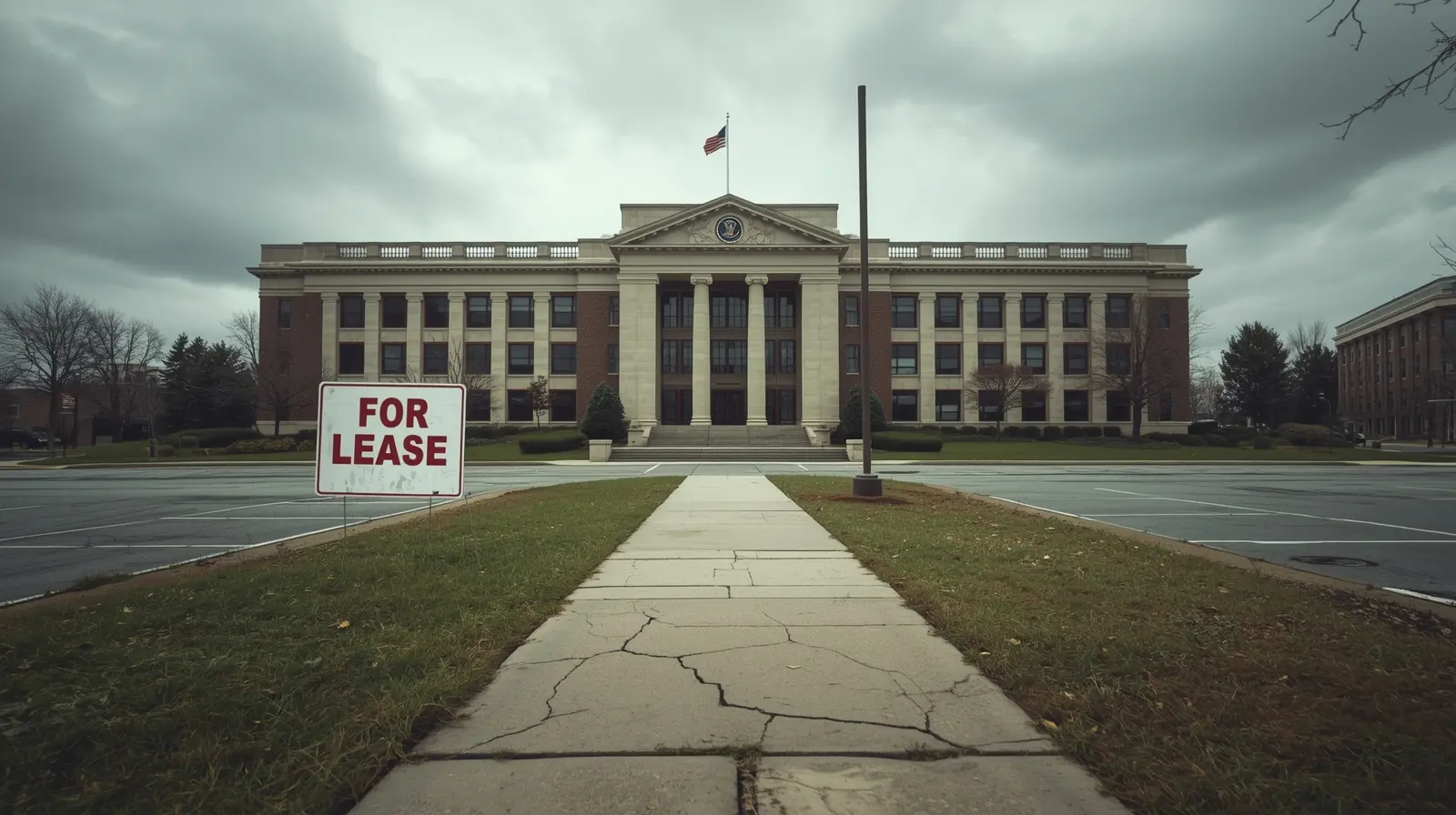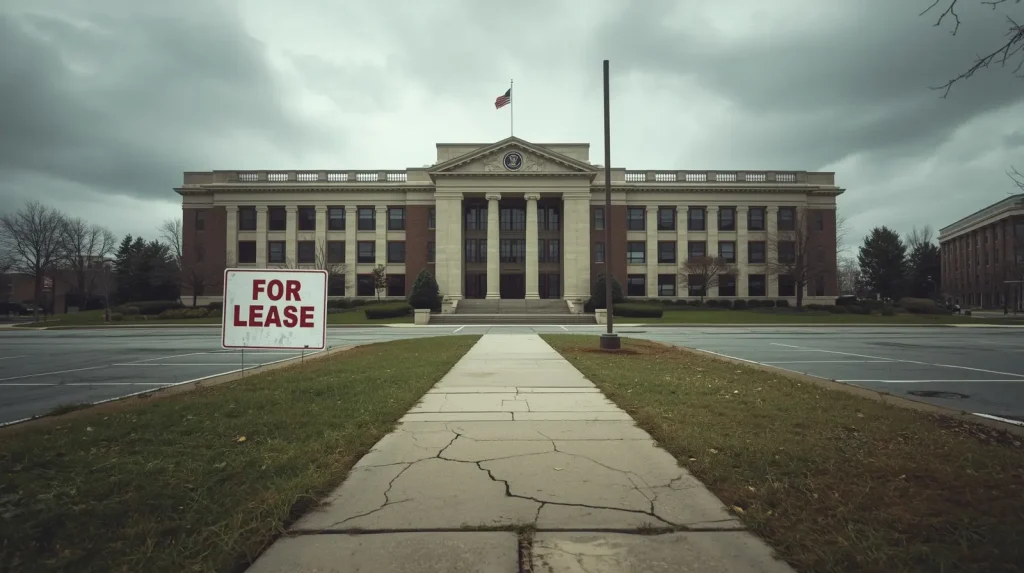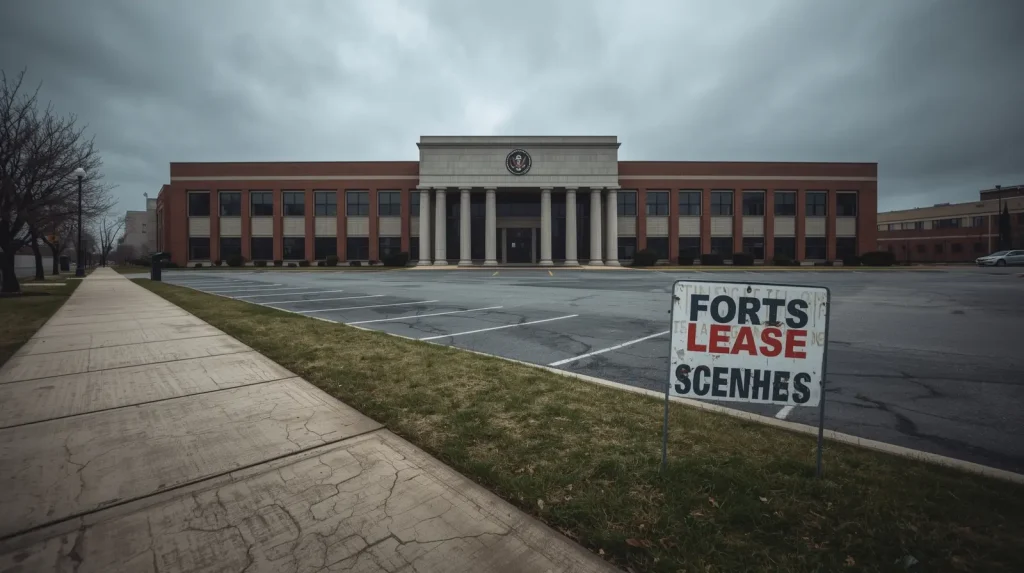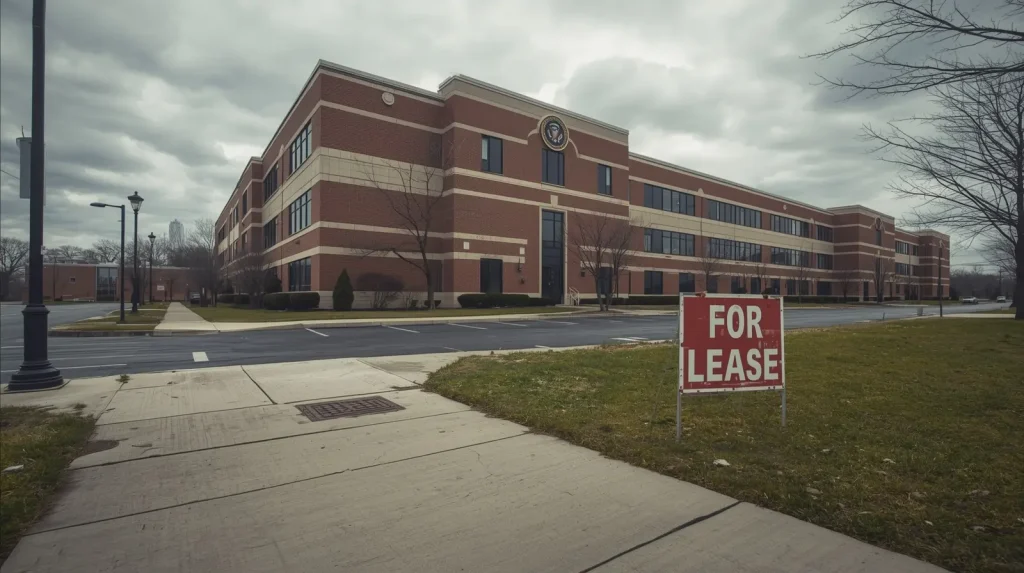
How the Government Shutdown Is Shaking Up U.S. Real Estate
The impacts of a government shutdown are still felt across the U.S. economy, especially in the area of commercial real estate. While the budget is debated in Washington, the Department of Government Efficiency (DOGE) cancelling leases is causing ripples across the real estate markets in rural Michigan and in downtown D.C.
Markets across the U.S. feel the impacts. The savings are publicly touted by the DOGE at $140 million, and houses are flying off the shelves. The real question is, how much of these savings are going to affect the commercial lending market, threaten the values of the properties, and leave rural landlords abandoned with the vacant government buildings?
Let’s discuss the reconfiguration of real estate, shifting finance, and the loss of economic confidence caused by a government shutdown.
The Real Estate Fallout of a Federal Budget Standoff
In the U.S. government shutdown, the first since 2018, economists and realtors are in a very delicate position. Federal office lease cancellations are no longer a bureaucratic move, but a market impacting move.
Cameron LaPoint, a finance professor at Yale, mentions that in the past, the Central Government was considered a low-risk tenant. Even DOGE was able to afford empty buildings.
“When the government cancels a lease, landlords are left high and dry.”
This is doubly concerning because buildings occupied by government tenants are usually large, strategically located in the downtown or civic center and are key anchors that help stabilize various commercial mortgage-backed securities (CMBS) with their revenue.
Lease Cancellations Create Financial Domino Effects
CANCELING 384 LEASES IS A SMALL PROPORTION OF FEDERAL REAL ESTATE, BUT THE DOWNSCALE IS MANAGING LONG TERM CONSEQUENCES. Each lease is an anchor tenant, and securitized leases allow the government to influence the IB balanced exposed.
Mark Besharaty, Senior VP at Arbor Financial Group, puts it this way: “When a government property sits empty, it can affect the interest rate of the entire asset pool it’s part of.”
This is due to the fact that the commercial lending ecosystem is built on stability and predictability. Take away one federal lease and lenders become wary. Take away hundreds and you get instability in lending across the country. Quietly, that is one of the consequences of this government shutdown that is ongoing.
Disparate Impacts of the Economy: Urban vs Rural
The economic consequences, however, are not evenly shared. Rural areas are not likely to find new tenants, while metro areas may attract new tenants eventually.
Cameron LaPoint points out that 63% of the at-risk leases are in areas that are outside the top 100 most populated counties. These areas don’t have the foot traffic, demand in the market or the investment that major cities provide, and that’s why losing a federal tenant is hard to replace.
In the Upper Peninsula of Michigan, Mayor Michelle Hanley notes that some closures, like the IRS office, may go unnoticed because of remote operations, but others, especially tribal services, are felt very deeply.
“Cuts to the Bureau of Indian Affairs and tribal health center are going to hit hard,” Hanley states.
In this case, a government shutdown for rural landlords is not simply a financial loss; it is a loss of the community.
Landlords Face Creative Repositioning
Landlords in the U.S. are creatively responding to the changing economic climate. With a large amount of real estate sitting unoccupied, they are trying to find new ways to use old buildings.
Realtor Alexi Morgado commented on the new creative building challenges landlords have.
Landlords are having to “reposition” and “reconfigure” old buildings.
More complex challenges are the conversions of former government office buildings into multifamily housing, mixed-use, and co-working properties, which are also complex and expensive to pull off — in a government shutdown, challenging in all three ways.
Top Agencies Affected by Lease Terminations
According to DOGE, the three agencies downsizing the most office space are: the Social Security Administration, the Small Business Administration, and the Geological Survey.
Each of these agencies has a large amount of unneeded office space and offices of all sizes, from Washington D.C. where the Social Security Administration has 845,000 square feet, to a 250 square foot office of the Secret Service in NYC.
The Macroeconomic Angle: A Keynesian Reversal
Experts describe the government activities stemming from Summary 1.112D to F as contractions of reckless government spending. These are the opposite of the government exercising Keynesian economic principles which would expect a stimulus, as spending on office space would stimulate economic activities. A government shutdown combined with lease cancellations acts as a form of anti-stimulation to the economy.Tom Whalen, who teaches business administration, explains it this way:
“When the government pulls money out of the economy, activity contracts. The effect trickles down to landlords, lenders, and the staff.”
As the Trump administration indicators potential layoffs at the federal level, the effects will worsen even more, further impeding spending and the economy’s momentum — precisely the scenario economists worry about during a government shutdown.
Assessing the government’s impact on the economy, the greatest loss is possibly the loss of confidence — from landlords, lenders, and investors.
Commercial mortgages tied to federal government contracts are seen as safe bets. Now, they feel exposed. In times when properties are underused, the economic costs of this government shutdown will outweigh the poorly calculated “savings” of $140 million in leased space.
As LaPoint expresses, “The economic model doesn’t just break from vacancy — it breaks from lost predictability.”
Current prediction markets state the government will possibly be on lockdown for 2 week at a time — this is seemingly the average opinion, and it is no surprise.
If this is the case, the results on commercial real estate, and especially in less populated parts of the nation, will be difficult to change. What began as temporary as a government initiated economic activity will become a long term stagnation and impact on the economy.
Conclusion: A National Issue, Not Just a D.C. Problem
The federal budget impasse tends not to be viewed as a national problem. However, government shutdowns have real, costly impacts on the whole country. Florida landlords and Michigan mayors are coping with the difficult consequences of terminated leases and federal spending cuts.
The length of the shutdown is directly correlated to the damage done to the underlying the problem in the U.S. real estate market.



Table of Contents
Reference Website : https://www.cnbc.com/2025/10/01/shutdown-risks-government-budget-cuts-economy-doge.html
Read More Article : https://bizrush.co/
More In The Bottom Line

Home Prices Steady
Homebuyers Stay Slow and Steady in 2025 as Housing Market Begins to Cool As we move into 2025, the American housing market is almost entering a phase of balance and…

Widowhood To Wealth
Widowhood to Wealth: The Journey of Brandi Lewis, Atlanta’s Top Luxury Real Estate Advisor With almost two decades of work under her belt, Brandi Lewis has become one of the…

Markets Favor Buyers
The U.S. housing market is gradually shifting toward buyers as inventory rises and homes linger longer on the market. Real Brokerage’s June survey of over 140 agents revealed that 48%…
Read More
US Tightens Tech Curbs, Beijing Calls Move ‘Extremely Malicious’
Tensions Escalate Amid New US Export Restrictions on Chinese Tech Firms: Beijing Calls Move ‘Extremely Malicious’ Hong Kong – October 1, 2025 – The United States expanded its export restrictions…

Trump Targets Non-US Films with 100% Tariff Threat
Trump Goes After Non-US Movies with 100% Tariff Threat Trump is making headlines again, this time in the entertainment industry. He is threatening a 100% tariff on movies produced outside…

Boeing Regains Partial 737 & 787 Certification Power
Boeing’s Return to Partial Certification Authority Boeing has started a new chapter in its history after receiving renewed authority to certify certain 737 Max and 787 Dreamliners as airworthy. This…







